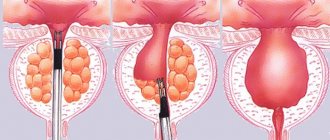The article was checked by an obstetrician-gynecologist of the highest category Lisichkina E.G., is for general informational purposes only and does not replace specialist advice. For recommendations on diagnosis and treatment, consultation with a doctor is necessary.
From 15 to 60% of women experience complaints of pain during sexual intercourse, but most of them do not consult a doctor due to the sensitivity of the problem.
But pain during sex often accompanies a specific gynecological disease, which only a specialist can identify.
Gynecologists at the Yauza Clinical Hospital will conduct a modern and in-depth examination of the genital area, determine the cause of dyspareunia (painful sexual intercourse) and help get rid of the problem as quickly as possible.
Make an appointment with a gynecologist
Dyspareunia – pain in the genital area and in the uterus during intercourse. They develop due to the close interweaving of organic and mental factors. They include disorders that are heterogeneous in their formation mechanisms and are common among women from 18 to 45 years of age.
Initially, the term “dyspareunia” was considered exclusively from the side of sexology. Various meanings were attached to it, ranging from the inability to achieve orgasm to the painfulness of sexual intercourse. But predominantly mental factors were considered as the causes of dyspareunia. Now the integral and multilateral nature of the development of such violations has already been proven. That is why not only sexologists, but also andrologists and gynecologists provide treatment.
Types of dyspareunia
In accordance with the modern classification of ICD-10, the following types of dyspareunia are identified:
- Organic – a symptom of a genitourinary tract disease.
- Psychogenic – refers to the category of sexual dysfunctions that are not caused by an organic disease.
- Mixed - combines the primary organic and layered psychogenic form.
In the case of psychogenic dyspareunia, pain during sexual intercourse has no obvious cause. Their source is emotional factors. In the literature, this condition is considered as a symbolic bodily symptom that has the meaning of rejection of a specific sexual relationship or sexual partner. The distinction between dyspareunia of psychogenic and organic nature has a division of responsibility for sexologists and gynecologists.
Gynecologist's advice on pain during sex, video
is not responsible for the accuracy of the information presented in this video clip.
Source - Live Healthy! Sources:
- ORGANIC AND PSYCHOSOMATIC DYSPAREUNIA (COMPARATIVE ANALYSIS). Fedorova A.I. // Russian family doctor. – 2006. Series “Original Scientific Research”. – pp. 21-25.
- INTERDISCIPLINARY APPROACH TO THE THERAPY OF DYSPAREUNIA. Fedorova A.I. // Journal of Obstetrics and Women’s Diseases 2006. – No. 4. – P. 101-104.
- Functional female sexopathology. Zdravomyslov V.I., Anisimova Z.I., Libikh S.S. // Alma-Ata: Kazakhstan. - 1985. - P. 272.
- Clinical and physiological basis of psychosomatic relationships. Gubachev Yu.M., Stabrovsky E.M. // L.: Medicine. - 1981. - P. 214.
- Differentiated pathogenetic approach to the treatment of dyspareunia. Fedorova A.I. // Russian family doctor.— 2005.— No. 2.— P. 22–27.
- https://ru.wikipedia.org/wiki/%D0%91%D0%BE%D0%BB%D0%B5%D0%B7%D0%BD%D0%B5%D0%BD%D0%BD%D1 %8B%D0%B9_%D0…
Causes of pain during sexual intercourse
Stress plays a leading role in the development of the psychosomatic type of dyspareunia. We are talking about personal problems that cause mental discord and lead to a number of negative emotions and self-doubt. Psychosomatic dyspareunia is characterized by the presence not so much of traumatic factors, but of a certain disturbance in the situation coupled with a protracted emotional conflict (rejection of the female role in sexual relationships or distrust of the sexual partner).
Stress and the emotions that accompany it are reflected in the form of spasms of the pelvic floor muscles. This leads to impaired microcirculation and pain at the time of insertion of the penis. At first, the changes that occur in the genital area are reversible and functional. But over time, irreversible structural changes in the genitals develop against the background of dystrophic processes. A vicious circle of psychosomatic relationships is formed, which determine the appearance of organic changes in the genitals.
With organic dyspareunia, the causes in 100% of cases are associated with pathological processes occurring in the genitals. Psychotraumatic factors are the cause of the development of pathological disorders in this case extremely rarely. Most women are not aware of the connection between dyspareunia and traumatic factors, preferring a somatic interpretation. But analysis of the development of pain dynamics and careful interviewing show the opposite.
Inflammation of the genital organs
Inflammatory processes cause the development of the following diseases, which cause pain during sexual intercourse:
- Colpitis, vulvovaginitis. Pain during sexual intercourse is caused by an infectious and inflammatory process of the vulva (external genitalia) and vagina. Inflammation, pain/discomfort occurs at the beginning of coitus, when attempting to insert the penis, which is caused by irritation and swelling of the mucous membrane of the external genitalia. In addition to pain, the patient is bothered by copious vaginal discharge with an unpleasant odor, itching and burning of the vulva.
- Inflammation of the ovaries (oophoritis) or uterine appendages (salpingoophoritis or adnexitis). During sexual intercourse, a woman feels aching pain in the lower abdomen, on the right or left (depending on the side of the fallopian tubes and ovaries) or above the pubis (with bilateral inflammation). Other signs include fever, pain in the lower abdomen at rest and during exercise.
- Inflammation of the uterine mucosa (endometritis). Sexual intercourse causes pain in the lower abdomen, and sometimes bloody discharge may occur. The nature of the pain is aching, pulling. The development of endometritis is provoked by intrauterine interventions (curettage and abortion, insertion and removal of the IUD).
About 40% of divorces are caused by problems in sexual relationships, in particular, the spouse’s refusal to have sex. Make an appointment with a specialist, regain the joy of love and harmony in your family.
40% of divorces are caused by problems in sexual relationships, in particular, the spouse’s refusal to have sex. Make an appointment with a specialist, regain the joy of love and harmony in your family.
Gynecological pathology of non-inflammatory origin
Dyspareunia can develop against the background of tumor or dishormonal disorders, which are accompanied by atrophic, dystrophic and hyperplastic processes:
- Endometriosis. With this disease, endometrial cells grow in unusual places (in the muscular layer of the uterus, in the ovaries, in the abdominal cavity or on the cervix). During the menstrual cycle, endometrioid lesions undergo the same changes as the uterine mucosa (bloody discharge during menstruation and pain before menstruation). In the case of cervical endometriosis, acute pain appears during sex, and in case of endometriosis of the ovaries or uterus, the pain is aching and localized above the pubis, in the lower abdomen.
- Malignant tumors of the cervix. Cervical cancer in advanced cases (stage 3-4) is also accompanied by dyspareunia. In addition to pain, a woman notices bloody or dark brown discharge from the genital tract after sexual intercourse.
- Atrophy of the vulvar and vaginal mucosa. Such changes sometimes make sexual activity impossible due to pain.
- Ovarian tumors and cysts. At rest and in the absence of complications, aching or nagging pain in the right or left iliac region is bothersome. During sexual intercourse, complications may develop - torsion of the leg of a tumor-like formation or rupture of a cyst, which is accompanied by sudden sharp pain in the lower abdomen. Later, nausea and vomiting, weakness and pale skin appear.
Other reasons
There are also a number of third-party factors leading to the development of dyspareunia:
- Inflammation of the bladder (cystitis). Pain during sexual intercourse can be caused by cystitis, which is associated with the close location of the bladder and uterus. The inflamed bladder comes into contact with the uterine wall, which causes pain.
- Adhesive process of the small pelvis. Pelvic adhesions almost always provoke dyspareunia. The nature of the pain is dull, monotonous, the intensity of pain changes when changing body position.
- An attempt to endure pain without showing it leads to the development of psychological problems and damage to internal organs. Do not lead the situation to serious pathologies. Make an appointment with a doctor and get rid of the problem once and for all.
An attempt to endure pain without showing it leads to the development of psychological problems and damage to internal organs. Do not lead the situation to serious pathologies. Make an appointment with a doctor and get rid of the problem once and for all.
Urological diseases
Pain after sex in men occurs with the following urological diseases:
- urethritis;
- balanoposthitis;
- chronic prostatitis;
- vesiculitis;
- rapid ejaculation.
Inflammation of the urethra, bladder, and ascending infections in the genitourinary system are the main causes. If the pain is clearly localized and does not intensify, injuries to the frenulum and compression of the genitals by tight clothing are possible.
Associated symptoms:
- urinary disturbance;
- enlarged inguinal lymph nodes;
- atypical discharge;
- increased body temperature;
- feeling of incomplete emptying of the bladder.
The pain may intensify immediately after ejaculation, during active physical activity, and during sharp turns. A stable increase in pain is a reason to make an appointment with a urologist as soon as possible!
Symptoms of dyspareunia
In 100% of patients with organic dyspareunia, a number of pathological changes in the genitals are observed against the background of a wide range of gynecological diseases:
- moderate changes in the mucous membrane of the vagina and vulva (maceration, cracks, hyperemia);
- diffuse pain of the genitals upon palpation, characteristic of impaired microcirculation and congestion in the pelvic area.
Pathogenic microflora in dyspareunia is usually absent. Differences are also present in the nature of the pain that women experience during sexual intercourse: heaviness in the lower abdomen, a feeling of vaginal chafing, burning and severe itching, a feeling of spasm and pressure, swelling of the genitals, pain in the lower abdomen.
Dyspareunia can develop during sexual intercourse with a certain partner or with different men and can be combined with various sexual disorders, such as decreased libido or anorgasmia. With long-term persistence of dyspareunia, the development of depressive states and neurotic reactions is observed. As a result, interest in sexual life is lost.
No entry allowed
Feel
When excited, throbbing pain occurs in the labia. Sometimes it can be so strong that sexual intercourse is simply impossible. You can also feel lumps near the entrance to the vagina.
Probable Cause
Bartholinitis is an inflammation of the Bartholin glands (they are located on the inner labia and are responsible for the secretion of lubricant during sexual arousal), while the channels become clogged and swelling and discomfort appear. Similar symptoms are observed with glandular cysts; if they appear on both sides, then entry into the vagina will be extremely difficult. In this case, you need to contact a gynecologist as soon as possible.
Diagnosis of pain during sexual intercourse
Gynecologists at the Yauza Clinical Hospital carefully study the patient’s medical history and carefully examine the external genitalia, vagina and cervix, as well as bimanual palpation of the uterus and appendages. Additional diagnostic methods are prescribed:
- Testing for sexually transmitted infections. Taking smears from the vagina and cervix, determining hidden sexually transmitted infections using PCR (for colpitis, vulvovaginitis).
- Ultrasound of the pelvic organs. A safe and effective method for detecting many gynecological diseases.
- Colposcopy and vulvoscopy. Examination of the cervix, vulvar mucosa and vagina under magnification helps to identify various pathologies of the mucous membranes of the genital organs.
- Hysteroscopy. Hardware examination is carried out if uterine endometriosis is suspected.
- Laparoscopy. Performed to diagnose adhesive disease and dissect adhesions through punctures in the abdominal wall.
Pain may appear after many years of marriage. According to statistics, every tenth woman experiences regular pain during sexual intercourse. To get rid of the problem forever, make an appointment with a gynecologist. Examination and treatment in our clinic is safe, anonymous and effective. Make an appointment and we will take care of your health.
No need for feats
Do not forget that pain is, first of all, a warning signal about disorders in the body, and you should not “endure for the sake of love.” When a woman bravely endures unpleasant sensations, the mucous membrane becomes inflamed and only gets worse. This is reflected in everyday life. Gynecologists note that such troubles often provoke increased irritability and lead to psychological problems. In addition, if the cause is infection, such heroism can lead to infertility. Therefore, you cannot waste time and put off visiting a gynecologist and treatment. Self-medication in this case is unacceptable.
Author: Maria Veselova Published: September 14, 2016
Treatment of pain during sexual intercourse
Advantages of examination at the clinical hospital on Yauza:
- conducting a comprehensive survey;
- modern diagnostic equipment (video colposcope, three-dimensional and four-dimensional ultrasound);
- extensive experience as gynecologists;
- quick and accurate determination of the cause of pain during sexual intercourse;
- consultations with related specialists if necessary.
You can see prices for services in the price list or check by calling the phone number listed on the website.
Prognosis and prevention
If you follow your doctor's recommendations, the appearance of pain in the lower abdomen during sexual intercourse can be avoided or eliminated. The prognosis in this case is favorable. The preservation of sexual functions is facilitated by raising parents with a positive attitude towards the sexual aspects of life, satisfaction with partnerships and harmonious psychosexual development, as well as personal characteristics.
Prevention of pain during sexual intercourse is regular sexual activity in the pre- and postmenopausal period. This approach promotes improvement. Blood circulation, activating the production of androgens. The hormone increases self-esteem and improves mood, maintaining orgasmicity and libido. Women who regularly have sex are less likely to complain of atrophic changes and dyspareunic pain.
To exclude the development of pathological disorders, stress, which is considered as a trigger for disorders of pain sensitivity, should be prevented. We are talking about dissatisfaction with changes in appearance, disappointment in partnerships and sexual relationships, distrust of a partner, fears of dangerous and disabling diseases, and disruption of urination processes.
In psychogenic dyspareunia in women, the sexual partner plays an important role. The situation worsens due to a lack of positive experience in the sexual sphere and personal character traits (dependence, self-doubt and increased anxiety). Effective elimination of psychogenic dyspareunia is only possible with the interested participation of both partners.
Pain may appear after many years of marriage. According to statistics, every tenth woman experiences regular pain during sexual intercourse. To get rid of the problem forever, make an appointment with a gynecologist. Examination and treatment in our clinic is safe, anonymous and effective. Make an appointment and we will take care of your health.
Make an appointment
How common is this phenomenon
According to various sources, dyspareunia affects a third of women at different points in their lives. The difficulties with a more accurate assessment are that, firstly, many women do not consider pain to be an abnormal part of sex and therefore do not consult a doctor. Doctors themselves do not pay attention to the symptoms of others.
Some studies Pain experienced during vaginal and anal intercourse with other-sex partners: findings from a nationally representative probability study in the United States show that 30% of women experience pain during vaginal sex, others - that 8–21% are affected by diagnosed dyspareunia , and in 15% it is chronic. Finally, 30% of women experience Consultation about Sexual Health Issues in the Year after Childbirth: A Cohort Study persistent pain during sex one year after childbirth.
In Russia the situation is similar. Candidate of Medical Sciences, obstetrician-gynecologist Tatyana Rumyantseva said that about 30% of women go to the doctor with complaints of discomfort during sex.











